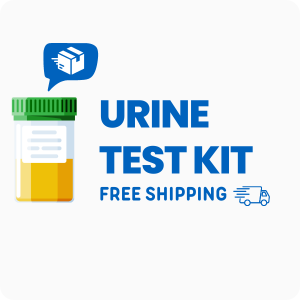Ordering the HLA DRB1,3,4,5,DQB1, Low-Resolution Test
This test checks for specific human leukocyte antigen (HLA) markers in your blood, which can help match organ and bone marrow donors, support autoimmune disease diagnosis, and guide certain medication choices. Interestingly, some HLA types can also predict how your body might react to certain medications, making this test useful for more than just transplant matching.
Ordering this test can provide you with:
- Clear information about your HLA type for organ or bone marrow donor matching
- Support for diagnosing autoimmune conditions like rheumatoid arthritis or celiac disease
- Guidance for doctors when prescribing medications that may interact with your immune system
- Insight into your genetic risk for certain immune-related conditions
- Documentation needed for family planning or genetic counseling
Who Might Benefit from HLA Typing and Genetic Marker Testing
People who are preparing for a bone marrow or organ transplant, or those with a family history of autoimmune conditions, may find this test especially helpful. For example, someone with a sibling who needs a kidney transplant may want to know if they are a compatible donor, and this test can provide that answer.
Ordering this test may also be helpful in these situations:
- Planning to donate bone marrow or an organ to a family member
- Experiencing symptoms that suggest an autoimmune disorder, such as joint pain or digestive issues
- Needing to confirm a diagnosis of celiac disease or another immune-related condition
- Starting a medication known to interact with certain HLA types, such as abacavir for HIV treatment
- Participating in a research study that requires genetic immune system information, which can sometimes reveal unexpected links to rare conditions
This test is ordered to help match donors and recipients, confirm or rule out certain immune system conditions, and guide medication choices based on your genetic profile. Delaying this test could mean missing a window for timely transplant matching or starting a medication that may not be safe for you.
Preparing for Your HLA Antigen and Genetic Marker Blood Test
No fasting is needed before this blood test, so you can eat and drink as usual. Always follow any instructions your doctor or healthcare provider gives you to make sure your sample is collected correctly and your results are as useful as possible.
Labs Included When Ordering Your HLA DRB1,3,4,5,DQB1, Low-Resolution
| Test Name | Reference Range | What This Biomarker Means | Low and High Levels of HLA DRB1,3,4,5,DQB1, Low-Resolution |
|---|---|---|---|
| HLA | Negative for disease-associated alleles | HLA markers are proteins on white blood cells that help the immune system recognize which cells belong in your body. This test checks for specific HLA types linked to disease risk and transplant compatibility. | High levels mean a greater presence of certain HLA types, which may increase risk for some autoimmune conditions or affect transplant matching.
Low levels mean fewer or no disease-associated HLA types detected, which may lower risk for some immune-related conditions. |
| DRB 1 | Negative for DRB1*03, DRB1*04, DRB1*15 | DRB1 is a gene that helps control immune responses. Certain types are linked to autoimmune diseases and are important for matching organ and bone marrow donors. | High levels mean a higher chance of carrying alleles linked to autoimmune conditions or transplant rejection.
Low levels mean a lower likelihood of these risk alleles, which may reduce risk for some immune disorders. |
| DRB 3 | Negative for DRB3*01, DRB3*02 | DRB3 is another gene in the HLA system, often tested to improve the accuracy of donor-recipient matching and to check for links to certain autoimmune diseases. | High levels mean a greater presence of DRB3 alleles, which may affect immune response and compatibility.
Low levels mean these alleles are not present, which may be favorable for some transplant matches. |
| DRB 4 | Negative for DRB4*01 | DRB4 is checked to further refine HLA typing, especially for people with certain DRB1 types. It can influence immune system reactions and transplant outcomes. | High levels mean a higher chance of immune response complications in transplants.
Low levels mean a reduced risk of these complications. |
| DRB 5 | Negative for DRB5*01 | DRB5 is another HLA gene that can affect immune system function and is important for matching in certain transplant cases. | High levels mean a greater presence of DRB5 alleles, which may impact immune compatibility.
Low levels mean these alleles are not detected, which may be helpful for some matches. |
| DQB 1 | Negative for DQB1*02, DQB1*03 | DQB1 is a gene that helps the immune system recognize foreign substances. Certain types are linked to celiac disease and other autoimmune conditions. | High levels mean a higher risk for conditions like celiac disease or type 1 diabetes.
Low levels mean a lower risk for these conditions. |
Reference ranges may change over time. For the most current values, visit the Quest Diagnostics lab test directory.
HLA DRB1,3,4,5,DQB1, Low-Resolution FAQ
Is there HLA DRB1,3,4,5,DQB1, Low-Resolution testing near me?
You can find nearby locations for this test using the patient service center locator, which also lists mobile phlebotomy options for added convenience. Since this test is often needed for transplant matching or autoimmune diagnosis, having a nearby site makes it easier to get your blood drawn quickly and avoid delays in your care.
What is the cost of the test?
The price you see for this test includes all fees, including sample collection at patient service center locations. Ordering this test is worth it if you need to confirm donor compatibility or clarify an autoimmune diagnosis, helping you avoid unnecessary waiting or uncertainty.
How often should I retest?
HLA typing is usually done once, since your genetic markers do not change over time. Retesting may be needed only if there is a problem with the first sample or if a more detailed analysis is required for a specific transplant or medication decision.
How accurate is the test?
This test uses polymerase chain reaction (PCR) with sequence-specific primers to identify HLA alleles, providing a specificity of 99.8% and a sensitivity of 99.7%. TrueHealthLabs.com works with CLIA-certified labs to maintain high-quality testing standards you can trust.
Important Notes
- This test cannot be collected in NY, NJ, MA, and RI. Contact us with questions.
Medical Review Board
Reviewed by Jeff Donohue M.D. from Body Logic and Brady Hurst DC, CCCN. Written by True Health Lab’s team of editorial health contributors.
Disclaimer: This information is for educational purposes only and not intended as medical advice. Consult your healthcare provider for personalized guidance.
Why Customers Trust True Health Labs - What People are saying
Also rated 4.6 out of 5 based on 3452 ShopperApproved reviews- See all TrueHealthLabs.com reviews.








